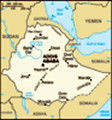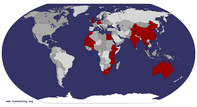Advertisement
Published: September 5th 2007
Now, I don't usually take to quoting Tony Blair for the titles of my posts, but the above quote is perhaps one of the most appropriate things the once-PM and once-decent guy ever said. One thing you cannot escape when you travel through Africa is the pure, unadulterated poverty that exists on this continent. As a brief illustration, let me quote some rankings from the UN Human Development Index. This is the list that tries to establish how poor a country is, not just by looking at pure economic figures, but by taking into account other factors, such as adult literacy rates and life expectancy.
So, of the African countries I've visited this year, let's look at their ranking out of 177:
Egypt (111); Morocco (123); Mauritania (153); Senegal (156); Cape Verde (106); Mali (175); Burkina Faso (174); Ghana (136); Togo (147); and Ethiopia (170). As a comparison, Australia stands at No.3.
If those numbers mean nothing to you, then how about pure per capita GDP. As an Australian, I'm worth about US$36,500 in GDP terms. The figures for Africa? Egypt = $1,500; Morocco = $1,886; Mauritania =$920; Senegal = $775; Cape Verde = $2,370; Mali = $485; Burkina

 Old beggar guy
Old beggar guy
An old door-to-door beggar, who popped into the kid's foster home while we were thereFaso = $350; Ghana = $600; Togo = $350; and Ethiopia = $90. That last figure, though not a reflection of the actual earnings or purchasing power of your average Ethiopian, is pretty damned low. I spend it in about 5 days here.
From the hordes of streetkids here in Gondar, to the swollen-bellied babies of Mali, to the crumbling roads of Senegal, to the blackouts of Accra, to the alcoholism of Cape Verde, to the quiet desperation of Moroccan shopkeepers, poverty manifests itself in different ways around the continent. Just because people aren't wearing rags and living in the gutter, it doesn't mean they aren't poor. Often people do their best to maintain their dignity, by
pretending they aren't poor: they wear their nice set of clothes out, they buy you coffee when you meet up, they talk about their plans of buying a house, or visiting overseas. But the figures and the reality are clear - most Africans are just making ends meet, and the few you see with a private car, or their own (cement) house, or meat for dinner once a day, are the tiny minority.
The reasons for this situation are generally pretty

 The rice lugger
The rice lugger
Me carrying a 50kg rice sack over to the 2 tonne pile, ready to feed the masses...clear: a tragic blend of corruption, economic mismanagement, misdirected aid, poor health and education, exploitation of resources by multinational companies, tribalism, war, and climatic disasters. Whether you think it's more the fault of imperialism, or of the current leaders, or the weather, or African traditions, doesn't really matter: the cycle of poverty is firmly in place, and as the wheel grinds around, innocent Africans are being caught up in it and crushed.
The solutions are a bit trickier to agree on, to say the least. On a macro-level, most people have given up. How can you direct vast sums of aid money to a country like Kenya, when some arsehole like Daniel arap Moi is going to skim off billions for himself? What's the point of trying to help entire nations that can't seem to help themselves? Why invest in the Congo, when the tribes there are just going to spend every cent they have on acquiring guns to finish each other off? Why deal with dictators like a Gnassingbe or a Mugabe or a Mubarak, when you can give your hard-earned aid dollars to more palatable rulers in Asia or Latin America? Why even bother trying to improve

 Iyasu's castle, Gondar
Iyasu's castle, Gondar
One of the rather bizarrely European castles of Gondar. The city was the Ethiopian capital for 200 years and every king built their own castle, styled on ones in India, Europe and the Middle Eastthe health or education of half-a-billion young Africans, when the chances are increasing every day that they will die of AIDS anyway?
Tough issues. Tougher answers. I don't pretend to know how to help. I will leave that to people who know more about it than me.
On the personal level, though, solutions are a little easier. Each and every one of us can help alleviate the suffering of one, or two, or a few African people, in very simple ways. True, our individual efforts may not help turn Africa into a thriving, wealthy powerhouse, where everyone has two cars in the drive and send the kids to private school, but even if we can make one day of this crappy existence a bit better for someone, it is an improvement on the current situation.
Saying, 'I won't bother to give money, because it goes to the wrong people' simply means that you give zero dollars to poverty-stricken Africans. Even if you only give ten bucks, and 90% goes to those who don't need it, then at least one dollar has gone to a poor person. And, in a country like Ethiopia, that's 4 days of per

 Tesfuhun
Tesfuhun
Tesfuhun, a great 13-year old kid, loves football, friendly as hell, only child of a mother with HIV.capita GDP.
I hate to sound all preachy here. That's not my intention at all. I do no more than any other person does. My intention is to try to put my own personal slant on a problem that we all know exists.
Now - to my own paltry efforts. I have been a lazy bastard when it comes to dealing with African poverty. Some people - for example, Sister Fanita, or Sister Rose, at the Mother Theresa mission here in Gondar - devote their entire lives to helping the sick, dying and destitute. Others, such as the large number of Peace Corps volunteers we have met, take two or three years away from their comfortable American lives to help with education and health in tiny, obscure, African (and other) villages. Some folks make it their profession, learning Development at university, and working for an NGO, or using their skills to assist the Red Cross, or the UN, or Medecins San Frontieres. Then you have the people who just try to lend a hand, by helping out in a school, or an orphanage, or on a project, for a few days, or weeks, or months. Still others give

 Giruma
Giruma
11 years old, orphan, no arms, but a keen footballer and actually pretty good in goal. Another great kid, given a shot at life thanks to the nuns.monetary support, sending cash to aid organisations or worthy causes, or sponsoring children over here. Even tourists do their bit - whatever negative effects tourism has on Africa, it does bring in some money, and every foreigner here knows that they pay more for basic goods and services than everybody else does . Every dollar spent in a local shop, or hotel, or restaurant, helps in its own way.
I have fallen very much into that last category, and my own feelings of guilt were catching up with me. About two weeks ago, I met a couple of English guys, Sam and Alex, who were over here to do their own bit for poor Ethiopians - Alex to sort out a foster home he set up two years ago for a bunch of streetkids, Sam to volunteer at the Mother Theresa mission here. So I decided to tag along with Sam, lending a hand at the 'compound', as the orphans and patients call it.
I was only there a week, but what a bloody awesome week it was. I met some amazing young guys, including Giruma, an armless orphan who is surprisingly good as a goalkeeper; Tesfuhun, one

 Taytu
Taytu
Rather cheeky but cute girl in the female ward, always keen for a photo.of the friendliest teens you could imagine, whose mother is seriously ill with HIV; and Solomon, a disabled Sudanese guy who couldn't speak a word, and wanted to hold my hand everywhere I went all week. We got stuck into washing sheets, holding babies, handing our food, teaching English, playing football, and singing nursery rhymes for the toddlers. I made the mistake of taking my camera, and having to take photos of half the compound. I made the further mistake of taking my guitar, and being roped in to play two songs at the official celebration of Mother Theresa Day. I made the even bigger mistake of taking along some photos of my friends and family - a herd of single mums jostled for ownership of some of them, so now there is a young lady here who owns a photo of Jeff, and another who is carrying a shot of my brother and sister around in her pocket.
The highlight of the week - apart from the Mother Theresa concert, an extravaganza of dancing, comedy, drama and me doing Bob Marley - was the fortnightly rice-and-oil handout. Over two days, about 1000 people lined up in orderly queues

 Solomon - wearing my sunnies
Solomon - wearing my sunnies
Solomon, the Sudanese guy who followed me around all week, holding my hand and carrying my bagat the centre, while Sam, me and a bunch of others literally sat in a 2-tonne heap of American-provided rice, scooping 6kgs out for each recipient. it all went like clockwork, and nobody pushed, or shoved, or tried to get more than their allotted amount. I never thought that pouring containers of rice into poor people's sacks could be great fun, but it was. The occasional Ethiopian peasant would try to practise their English on us, which was always better than our poor attempts at Amharic. We ended our shifts sore and covered in rice flour, and thoroughly exhilarated from the experience.
Yep, it was great fun, heart-rending, but great fun. These people owned so little - most had two changes of (donated) clothes, and barely a cassette or book to their name - yet they were so welcoming, so friendly, and so appreciative of someone just kicking a ball around with them, or sitting down for a chat. I wish I had done it sooner. I wish I had done more. I will definitely devote more time and money to helping these wonderful, unfortunate folks, once I get home.
And if you have a spare few dollars?

 Alex's foster home
Alex's foster home
Me, Sam, and Ashagga (in sunnies) posing with the streetkids Alex got off the street and into a foster home, in GondarGet on the internet, check out the Oxfam website, or Plan's, or Worldvision's, or the Red Cross, whoever. It may not go a long way. but it will go somewhere where it makes a difference.
Advertisement
Tot: 0.373s; Tpl: 0.026s; cc: 30; qc: 118; dbt: 0.2337s; 1; m:domysql w:travelblog (10.17.0.13); sld: 1;
; mem: 1.4mb














Ask
non-member comment
Thanks for reminding me about the Danish Red Cross Collection this Sunday ;) Nice to see you're experiencing a lot! Danish cheers from Ask